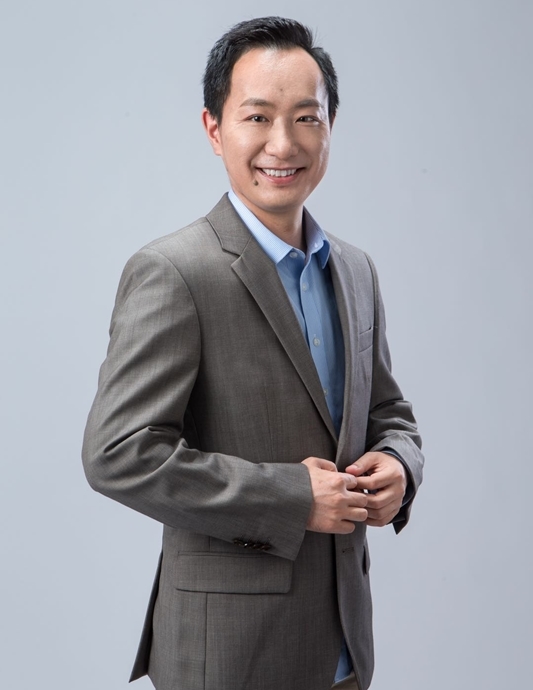
Phone: 86-10-62782882
Email: pengmin@tsinghua.edu.cn
Personnel
Topics of Research
Publications
Photo Gallery
Min Peng, Ph.D.
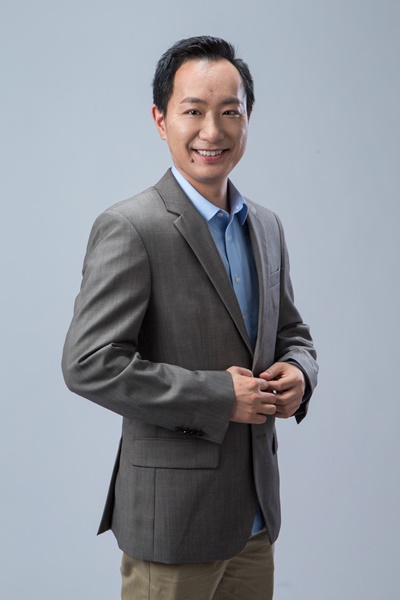
Education:
2000-2005 B.M., Clinical Medicine
West China Medical Center, Sichuan University, Sichuan
2005-2010 Ph.D., Immunology
Peking Union Medical College, Beijing
Employment:
2010-2014, Research Fellow, Immunology Program, Memorial Sloan Kettering Cancer Center, New York, NY, United States
2014-2017, Research Associate, Immunology Program, Memorial Sloan Kettering Cancer Center, New York, NY, United States
2017-2023, Assistant Professor, School of Medicine, Tsinghua University, Beijing, China
2023- 2024, Associate Professor, School of Medicine, Tsinghua University, Beijing, China
2024-present, Tenured Associate Professor, School of Medicine, Tsinghua University, Beijing, China
Honors & awards:
2019 Outstanding Young Scholar Award, Qiu-Shi Science & Technologies Foundation
2018 Bayer Scholar
2015 Postdoctoral Researcher Award, Memorial Sloan Kettering Cancer Center
Post-Docs
Lixia Wang, Ph.D.
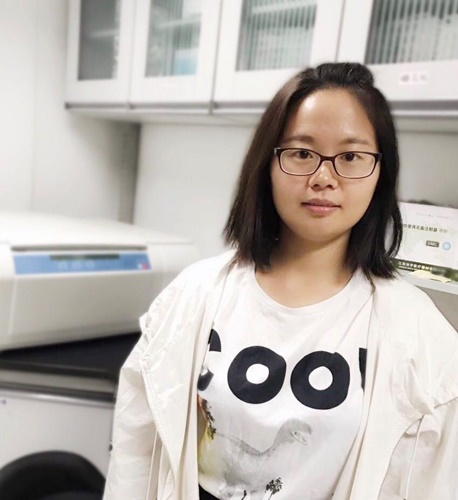
Lixia Wang received her Ph.D. degree from University of Chinese Academy of Sciences in 2018, then joined Min Peng’s laboratory for post-doctoral research. Her research focuses on the genetic modification of chimeric antigen receptor (CAR) T cell for adoptive cancer immunotherapy.
Xiaocui Zhao, Ph.D.

Xiaocui Zhao obtained her Ph.D. degree in cell biology from Zhejiang University and joined in Peng lab in 2018. Her research mainly focuses on CAR-T therapy.
Qiuping Zhou, Ph.D.

Qiuping Zhou is from Guangxi Zhuang Autonomous Region, and joined in Peng's lab as a postdoc in May 2021, got her Doctor of Immunology at Shanghai Institute of Biochemistry and Cell Biology, Chinese Academy of Sciences, in January 2021. Her research focuses on CAR-T therapy.
Students
Ying Liu
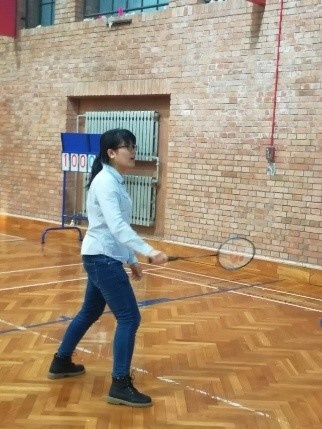
Ying Liu joined Peng's laboratory as a Ph.D student in 2017,with a bachelor's degree from Sichuan University. She worked on projects about mTOR, T cell proliferation and Calcium signal successively during doctoral training.
Hanfei Zhao
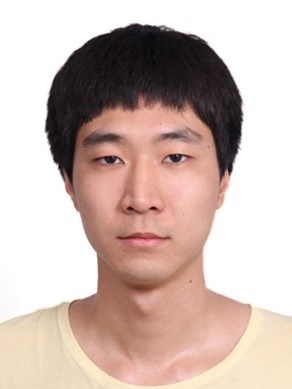
PhD student, his research focuses on Immunotherapeutic target discovery by genome-wide in vivo CRISPR screens in primary mouse T cells.
Guangyue Zhang

After graduated from School of Pharmaceutical Science, he joined the Lab of Dr. Min Peng at Institute of Immunology, Tsinghua University. During the Ph.D. training, Guangyue’s major research interest is the function, differentiation and fine-tuning co-receptor signaling in T cells. He is good at setting up and carrying out CRISPR based screening assays in both cell lines and primary T cells. Besides daily training, he is often playing tennis with friends as an amateur.
Gang Jin

Ph.D student (From2017) in PTN. Research focuses: Adoptive T cell therapy against cancer and autoimmune disease; Nutrient sensing pathway regulation of HSC function.
Yuying Ma
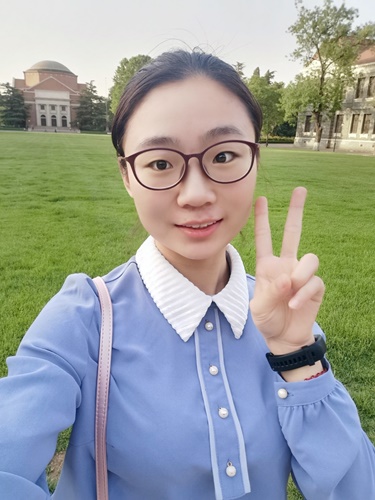
Yuying Ma, PhD student (since 2018) in School of Medicine, Bachelor’s degree from Wuhan University. Research focus: immune metabolism.
Jing Xu
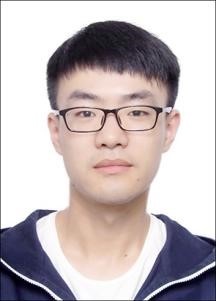
Jing Xu, PhD student (from 2018). Get his bachelor's degree from Soochow University. Currently, he mainly focuses on the research of calcium signaling in T cell biology and deciphers the role of calcium in T cell homeostasis.
Zihao He
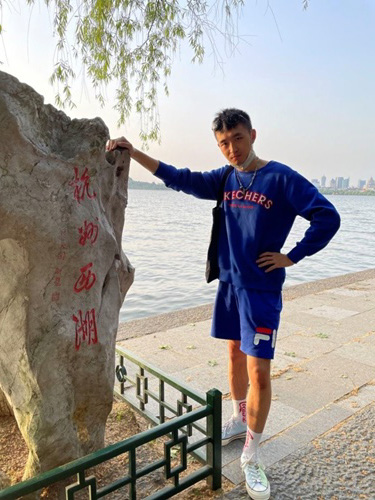
He Zihao joined Peng's laboratory in 2019 as a PhD student. He has been dedicated to the research on genetic modification in Treg cells for adoptive cell transfer.
Qing Shang

Qing Shang joined Peng lab in September, 2020, for research training as part of her MD program. With an interest in immunometabolism and metabolism in general, she is now focusing on the role of short chain fatty acids in physiological and pathological settings.
Xiaonan Ma
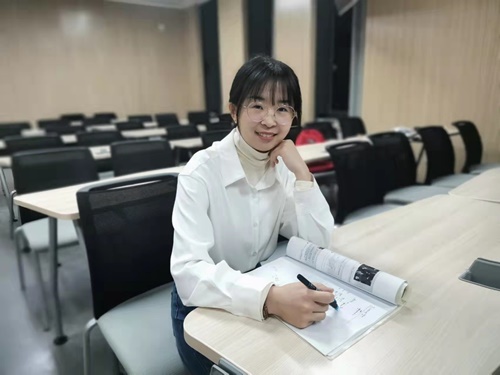
Xiaonan Ma, a PhD student (from 2020) in PTN. She obtained the bachelor degree in animal medicine from Jilin University. And her research interest is the mechanism of T cell memory formation.
Yun Yu
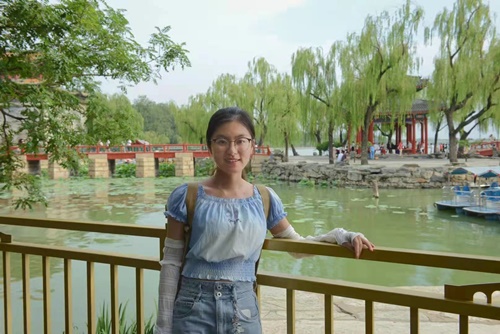
PhD student (since 2020) in Institute for Immunology of Tsinghua University. Received Bachlor's Degree (majored in Chemical Biology) from Xi'an Jiaotong University. Her research focuses on the interaction between CAR-T and the endogenous immune system. Likes photography.
Yanyan Liu
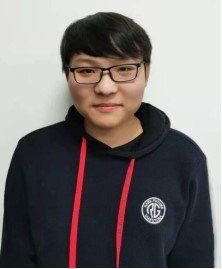
Yanyan Liu, a PhD student of class 2020, joined Peng Lab. after got his bachelor's degree from Sichuan University. Currently, he mainly focuses on the research of CAR-T targeted therapy. He is trying to change from a “naive” student to a “functional” and “productive” “effector” student.
Yibo Zheng
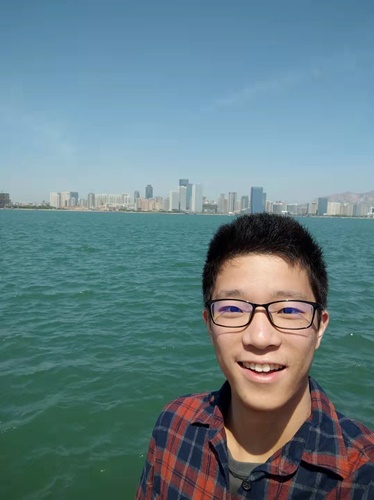
As a student of Doctor of Medicine (M.D.) major in Clinical Medicine, I joined the lab for the two-year scientific research training during my eight-year curriculum. My current research focuses on the functional genomics in primary T cells.
Research Interests:
T lymphocytes play a central role in anti-infection and anti-tumor responses. Abnormal T cells are also key pathogenic factors in autoimmune and inflammatory diseases. T cells are crucial in immunotherapy, with emerging therapies such as PD-1 antagonists and CAR-T cells involving interventions and modifications of T cells. Our laboratory has long been studying fundamental biological questions regarding T cells, including key regulatory processes and factors involved in activation, proliferation, differentiation, and memory, encompassing epigenetic, transcriptional, and metabolic factors. Based on this foundational research, we are actively developing various novel therapies based on T cells. Recently, our laboratory has induced a novel T cell state, termed Immortal-like and Functional T cells (TIF), which possesses nearly unlimited self-renewal capabilities similar to iPSCs while fully retaining the physiological functions of T cells. This represents a new form of mammalian cell existence, addressing the critical issue of the insufficient persistence of therapeutic T cells in vivo. In addition to their outstanding performance in tumor treatment, TIF-based T cells also have potential curative effects on various common non-tumor chronic diseases, such as asthma and rheumatoid arthritis. The Peng Min Laboratory will further explore the potential of T cell-based immunotherapies for common diseases and develop entirely new technological platforms to significantly reduce the cost of cell therapies, ultimately aiming to achieve complete cures for various common diseases, marking a breakthrough in medical history.
T淋巴细胞在抗感染和抗肿瘤中发挥核心作用。T细胞异常也是自身免疫和炎症性疾病的关键致病因素。T细胞也是免疫治疗的关键细胞,PD-1拮抗剂和CAR-T等新兴的免疫疗法都是对T细胞的干预和改造。本实验室长期研究T细胞基本生物学问题,包括激活、增殖、分化和记忆等过程的关键调控过程和因子,包括表冠遗传、转录、代谢因素等。基于这些基础研究,我们积极开发基于T细胞的各种全新疗法。近期,本实验室诱导出了一种全新的T细胞状态,命名为“类永生化功能性T细胞”(Immortal-like and Functional T cells,简称TIF),TIF具备类似于iPSC那样接近于无限的自我更新能力,同时完整保留了T细胞的生理功能,代表了一种新的哺乳动物细胞存在形式,解决了治疗性T细胞在体内持久性不足的关键问题。除了在肿瘤治疗中表现优异以外,基于TIF的T细胞还对各种常见非肿瘤慢性疾病,如哮喘、类风湿性关节炎等具有治愈潜力。彭敏实验室将进一步探索基于T细胞的免疫疗法对常见疾病的治愈潜力,同时开发全新的技术平台以大幅度降低细胞疗法的成本,期望最终实现对多种常见疾病的彻底治愈,实现医学史上的突破。
彭敏博士博士后期间发现并阐明mTORC1负向调节因子Sestrin和SZT2及其分子机制,发现代谢、表冠遗传和T细胞分化的联系,相关成果以第一作者身份发表在Cell (2014)、Science (2016)及Nature (2017)等期刊 。2017年, 彭敏博士入职清华大学开展独立科研和教学工作,致力于探索免疫学基本问题,尤其是记忆免疫记忆的本质及其操控。自实验室建立以来, 发现了T细胞新型钙离子通道,诱导出全新类永生化功能性T细胞(TIF),并首次通过细胞疗法在动物模型中治愈哮喘,以通讯作者身份在Nature Immunol (2024), J Exp Med (2023, 2024), J Clin Invest (2022)及Cell Reports (2021) 等期刊发表多项研究成果。
ORCID: 0000-0002-5885-0660
ResearcherID: O-3770-2017
Publications:
1. Gang Jin#, Yanyan Liu#, Lixia Wang, Zihao He, Xiaocui Zhao, Yuying Ma, Yuting Jia, Zhuoyang Li, Na Yin, MinPeng*. A single infusion of engineered long-lived and multifunctional T cells confers durable remission of asthma in mice. Nat Immunol. 2024. 2024. Jun;25(6):1059-1072.
Previewed by Bart Lambrecht and Hamida Hammad in Nat Immunol, “CAR T cells put the brakes on asthma”.
Highlighted by Yvonne Bordon in Nat Rev Immunol and Nat Rev Drug Discov, “CAR T cells take to the airways”.
2. Qing Shang,Zhuoyang Li, Na Yin, Min Peng*. Reconciling host-microbiota metabolic incompatibility safeguards male fertility. hlife. 2024;2:284–295
3. Lixia Wang#, Gang Jin#,Qiuping Zhou#, Yanyan Liu, Xiaocui Zhao, Zhuoyang Li, Na Yin, Min Peng*. Induction of immortal-like and functional CAR T cells by defined factors. J Exp Med. 2024 May 6;221(5):e20232368.
Previewed by Nicholas Restifo and Luca Gattinoni in J Exp Med, “Synthetic soldiers: Turning T cells into immortal warriors”.
4. Ying Liu#, Yuying Ma#, Jing Xu#, Guangyue Zhang#, Xiaocui Zhao#, Zihao He, Lixia Wang, Na Yin, Min Peng*. VMP1 prevents Ca2+ overload in endoplasmic reticulum and maintains naive T cell survival. J Exp Med. 2023 Jun 5;220(6):e20221068.
5. Min Peng*, Ming O. Li*. Metabolism along the life journey of T cells. Life Metabolism. 2023, 002(001)
6. Na Yin#, Gang Jin#, Yuying Ma, Hanfei Zhao, Guangyue Zhang, Ming O. Li,Min Peng*. SZT2 maintains hematopoietic stem cell homeostasis via nutrient-mediated mTORC1 regulation. J Clin Invest., 2022 Oct 17, 130(20):e146272.
7. Hanfei Zhao, Ying Liu, Lixia Wang, Gang Jin, Xiaocui Zhao, Jing Xu, Guangyue Zhang, Yuying Ma, Na Yin, Min Peng*. Genome-wide fitness gene identification reveals Roquin as a potent suppressor of CD8 T cell expansion and anti-tumor immunity. Cell Reports. 2021 Dec 7;37(10):110083.
8. Ke Xu#, Na Yin#, Min Peng, Efstathios G Stamatiades, Sagar Chhangawala, Amy Shyu, Peng Li, Xian Zhang, Mytrang H Do, Kristelle J Capistrano, Chun Chou, Christina S Leslie, Ming O Li. Glycolytic ATP fuels phosphoinositide 3-kinase signaling to support effector T helper 17 cell responses. Immunity. 2021. 54(5):976-87.
9. Ke Xu, Na Yin, Min Peng, Efstathios G Stamatiades, Amy Shyu, Peng Li, Xian Zhang, Mytrang H Do, Zhaoquan Wang, Kristelle J Capistrano, Chun Chou, Andrew G Levine, Alexander Y Rudensky, Ming O Li. Glycolysis fuels phosphoinositide 3-kinase signaling to bolster T cell immunity. Science. 2021. Jan 22;371(6527):405-10.
10. Mytrang H. Do, Xinxin Wang, Xian Zhang, Chun Chou, Briana G. Nixon, Kristelle J. Capistrano, Min Peng, Alejo Efeyan, David M. Sabatini, Ming O. Li. Nutrient mTORC1 signaling underpins regulatory T cell control of immune tolerance. J Exp Med. 2020 Jan 6;217(1):e20190848.
11. Min Peng, Na Yin, Ming O. Li. SZT2 dictates GATOR control of mTORC1 signaling. Nature. 2017 Mar16;543(7645):433-437.
12. Min Peng#, Na Yin#, Sagar Chhangawala, Ke Xu, Christina S. Leslie, Ming O. Li. Aerobic glycolysis promotes T helper 1 cell differentiation through an epigenetic mechanism. Science, 2016 Oct 28; 354(6311): 481-484. (#equalcontribution)
Preview in Science, 2016 Oct 28; 354(6311): 419-420. “Warburg meets epigenetics”.
Preview in Dev Cell, 2016 November 7;39: 286-287. “Metabolic Control of Cellular Differentiation”.
Preview in Cell Metab, 2016 November 8; 24: 651-652. “Metabolic Signaling Drives IFN-g”.
13. Jiangbin Ye, Wilhelm Palm, Min Peng, Bryan King, Tullia Lindsten, Ming O. Li, Constantinos Koumenis, Craig B. Thompson. GCN2 sustains mTORC1 suppression upon amino acid deprivation by inducing Sestrin2. Genes Dev. 2015 Nov 15; 29 (22): 2331-6.
14. Min Peng, Na Yin, Ming O. Li. Sestrins Function as Guanine Nucleotide Dissociation Inhibitors for Rag GTPases to Control mTORC1 Signaling. Cell. 2014 Sep 25; 159(1): 122-33.
Highlighted in Nat Rev Mol Cell Biol, 2014; 15: 701, “A RAG dissociation inhibitor”.
15. Weiming Ouyang, Will Liao, Chong T. Luo, Na Yin, Morgan Huse, Myoungjoo V. Kim, Min Peng, Pamela Chan, Qian Ma, Yifan Mo, Dies Meijer, Keji Zhao, Alexander Y. Rudensky, Gurinder Atwal, Michael Q. Zhang, Ming O. Li. Novel Foxo1-dependent transcriptional programs control Treg cell function. Nature. 2012 Nov 22; 491(7425): 554-9
16. Min Peng,Sha Guo,Na Yin, Jing Xue, Lian Shen, Qing Zhao, Wei Zhang. Ectodomain shedding of Fcalpha receptor is mediated by ADAM10 and ADAM17. Immunology, 2010, 130(1): 83-91
17. Min Peng; Na Yin; Wei Zhang. Endocytosis of FcaR is clathrin and dynamin dependent but its cytoplasmic domain is not required. Cell Res, 2009, 20(2): 223-237
18. Na Yin; Min Peng; Yukun Xing; Wei Zhang. Intracellular pools of FcalphaR (CD89) in human neutrophils are localized in tertiary granules and secretory vesicles, and two FcalphaR isoforms are found in tertiary granules. J Leukoc Biol. 2007, 82: 551-558
Complete list of publications: https://orcid.org/0000-0002-5885-0660

Copyright © 2017 Institute for Immunology Tsinghua University
Contact Address: Room D302, Medical Science Building, Tsinghua University, Beijing 100084, China
Tel: (86) 10-62776420 Fax: (86) 10-62776420
